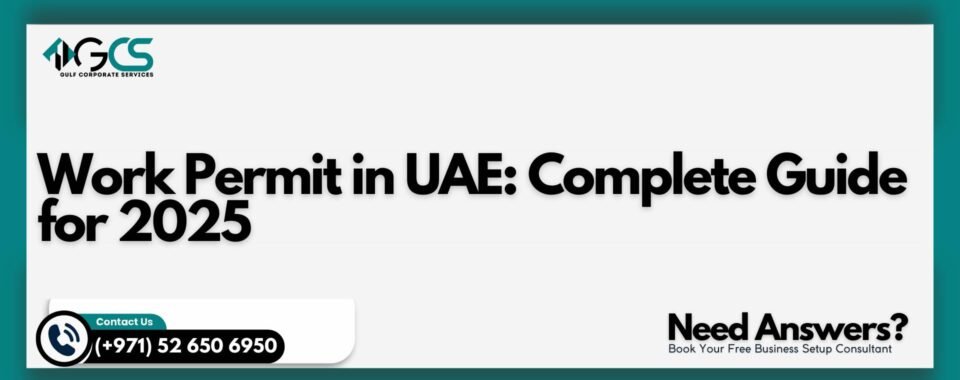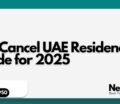
A work permit in UAE is essential for anyone looking to work legally in the Emirates. Whether you’re a skilled professional, an expat worker, or considering company setup in Dubai, understanding the UAE work visa process, requirements, and costs is vital. This article breaks down how to get your work permit in UAE, step by step.
What Is a Work Permit in UAE and Why It’s Important
A work permit in UAE is a legal document that allows foreigners to work in the country. It links your job to your residency visa, making it essential for anyone planning to live and earn in the UAE. Without it, working in the UAE is illegal.
Definition of a work permit in UAE
A work permit in the UAE refers to the employment visa or work residency permit that allows foreigners to work legally. It is sponsored by an employer and tied to a valid labor contract.
Benefits of Holding a legal work permit
Having a valid UAE work permit gives you the right to live, work, and enjoy government services. It also connects to an Emirates ID and potential residence visa renewal.
Key Requirements for a Work Permit in UAE
To apply for a UAE work permit, you need a valid job offer, passport, medical fitness report, and employer sponsorship. Some jobs may also require attested qualifications. The employer must be a registered company with a valid trade license in the UAE.
Employment contract and employer sponsorship
You must have a job offer from a UAE-registered company. Your employer sponsor will initiate the work permit application via MOHRE.
Health clearance and medical tests
You will go through mandatory medical screening including blood tests and chest X‑ray. You must pass to complete the work permit process UAE.
How to Apply for a Work Permit in UAE
Your employer begins the work permit process through the Ministry of Human Resources and Emiratisation (MOHRE). Once approved, you undergo medical tests, apply for your Emirates ID, and complete residency visa stamping. The process is usually completed within 2–3 weeks.
Labor approval via MOHRE
Your employer applies with MOHRE for a labor card approval. Once granted, they proceed with visa stamping.
Applying for residence visa and Emirates ID
After labor approval, you submit your passport and documents at a typing center. Then residence visa stamping and Emirates ID application complete the work permit in UAE journey.
Types of Work Permits and Employment Visas in UAE
The UAE offers several types of work permits, including standard employment visas, Golden Visas, freelance permits, and free zone visas. Each type depends on your profession, employer location, and contract. Choosing the right permit is key to legal employment in the country.
Standard work permit for full-time employees
This is the most common path—tied to a traditional employment contract and labor card.
Golden Visa and special residency options
The UAE offers the Golden Visa for investors, specialists, and entrepreneurs—a long‑term work permit UAE with additional flexibility.
Costs and Fees for a Work Permit in UAE
The work permit cost in UAE includes government processing fees, medical test charges, Emirates ID fees, and visa stamping. On average, total costs range from AED 2,000 to AED 5,000, typically covered by the employer. Freelancers or investors may pay this themselves.
Government fees and typing center charges
Typical work permit cost in UAE includes MOHRE processing, medical test fees, typing center charges, and Emirates ID costs.
Additional costs like sponsor’s stamp duty
Employers sometimes require deposit or stamp duty depending on the contract terms.
Work Permit for Skilled Professionals and Expats
Skilled professionals applying for a UAE work permit must provide degrees or certifications relevant to their field. The UAE prioritizes sectors like IT, healthcare, and engineering. A valid job offer, clean background, and medical clearance are essential to qualify for work authorization.
Requirements for skilled worker visa in UAE
You may need degree certificates, job offer letters, and professional accreditation to qualify for a standard or skilled work permit UAE.
Migrating to UAE with specialized professions
Fields like IT, healthcare, and engineering have streamlined options through Golden Visa schemes.
Renewing and Cancelling Your Work Permit in UAE
A UAE work permit is usually valid for 2 to 3 years. Employers handle renewal before expiry. If you resign or lose your job, your permit must be cancelled to legally exit or transfer jobs. Timely updates are crucial to avoid overstay fines.
Renewal process and timeline
Work permits and visas need renewal every 1–3 years. Your employer often takes care of this via MOHRE and immigration services.
Cancellation when leaving job or changing employer
If you change jobs, your previous work permit must be cancelled before a new one is issued.
Common Problems and How to Resolve Them
Delays or rejections in the work permit process can occur due to incomplete documents, failed medicals, or employer issues. Always ensure all paperwork is accurate. If rejected, you may appeal or reapply after resolving the issue. Legal help is useful in tough cases.
Visa processing delays
Delays may occur due to missing documents or backlog. Proper preparation avoids this.
Rejection due to medical or legal issues
Failing medical tests or having unpaid fines can block your work permit UAE—clear these issues early.
How to Switch Employers with a Work Permit in UAE
You can change jobs in the UAE by cancelling your current work permit and applying for a new one through the next employer. Depending on your contract and visa type, a NOC may be needed. Free zone to mainland transfers follow separate steps.
Validity periods and contract expiry
You may switch employers if your current visa or labor contract is nearing expiration or you have free zone employment.
No-objection certificate (NOC) and visa transfer
From 2022, most visas no longer require a NOC. Follow the updated visa transfer process through MOHRE.
Work Permit Rules in Free Zones vs Mainland UAE
In free zones, employers issue work permits directly, and you can only work within that zone. Mainland work permits follow federal MOHRE rules and allow more job flexibility. Knowing the difference helps you pick the right employment zone for your career goals.
Differences between mainland work permit and free zone visa
In free zones, companies sponsor visas directly; mainland roles follow MOHRE rules and require local sponsorship.
Portability of free zone work permits
Some free zone visas allow employment within the zone only; changing jobs may require cancelling and moving to mainland visa routes.
Family Sponsorship Under Your Work Permit
With a valid UAE work permit, you can sponsor your spouse and children if you meet income and housing requirements. You’ll need to provide proof of employment, tenancy, and health insurance. Sponsoring family members adds security and long-term stability while working in UAE.
Sponsoring dependents (wife and children)
With a valid work permit, you can sponsor family members. Requirements include minimum salary and housing proof.
Cost and eligibility for family visas in UAE
Dependent visa fees include medical checks, entry permit charges, visa stamping, and Emirates ID fees.
Impact of Work Permit on Business Setup in Dubai
A valid UAE work permit helps entrepreneurs set up and run businesses legally. Business owners can apply for investor or partner visas, allowing them to sponsor themselves. It’s a vital part of business setup, enabling full access to UAE’s business ecosystem.
Work permit’s role in company setup in Dubai, UAE
For entrepreneurs and business owners, obtaining your own work permit visa as manager or investor is key in business setup.
Flexibility and mobility it brings
A valid UAE work permit gives you legal status, access to services, and the ability to switch between jobs or start companies.
Conclusion
Securing a work permit in UAE is a critical step for anyone wanting to live and work legally in the Emirates. By understanding the requirements, application steps, renewal and cancellation process, and costs, you can navigate the system with ease. A valid UAE work permit also plays a pivotal role in business setup in Dubai, UAE, if you’re planning to launch a company. Follow the process carefully and maintain compliance to ensure long‑term residency and career flexibility.
FAQs
How long does it take to get a UAE work permit?
Usually 7 to 14 days, depending on document accuracy and processing time.
Can I switch jobs under a current work visa?
Yes, you can transfer after cancellation of your existing visa, following the updated MOHRE visa transfer rules.
How much does a UAE work permit cost?
It ranges from AED 2,000 to AED 4,500, depending on medical fees, typing, Emirates ID, and government charges.
Can freelancers get a UAE work permit?
Freelancers in specific zones (free zone freelance permits) can sponsor their own residence permit if allowed by the zone license.
What happens if my work permit is rejected?
You’ll receive feedback and must clear rejected issues—commonly medical, documentation, or age concerns—before reapplying.
Do I need a work permit for remote work in UAE?
If you reside and work locally, yes. Remote work permit options may exist under remote work visas but often require sponsorship.
Can I sponsor my parents with my work permit?
Generally no. You can sponsor parents only if your salary meets high-minimum thresholds or you hold a Golden Visa.
Is health insurance mandatory with work permit in UAE?
Yes, most employers provide health insurance as part of employment obligations linked to your residence permit.








